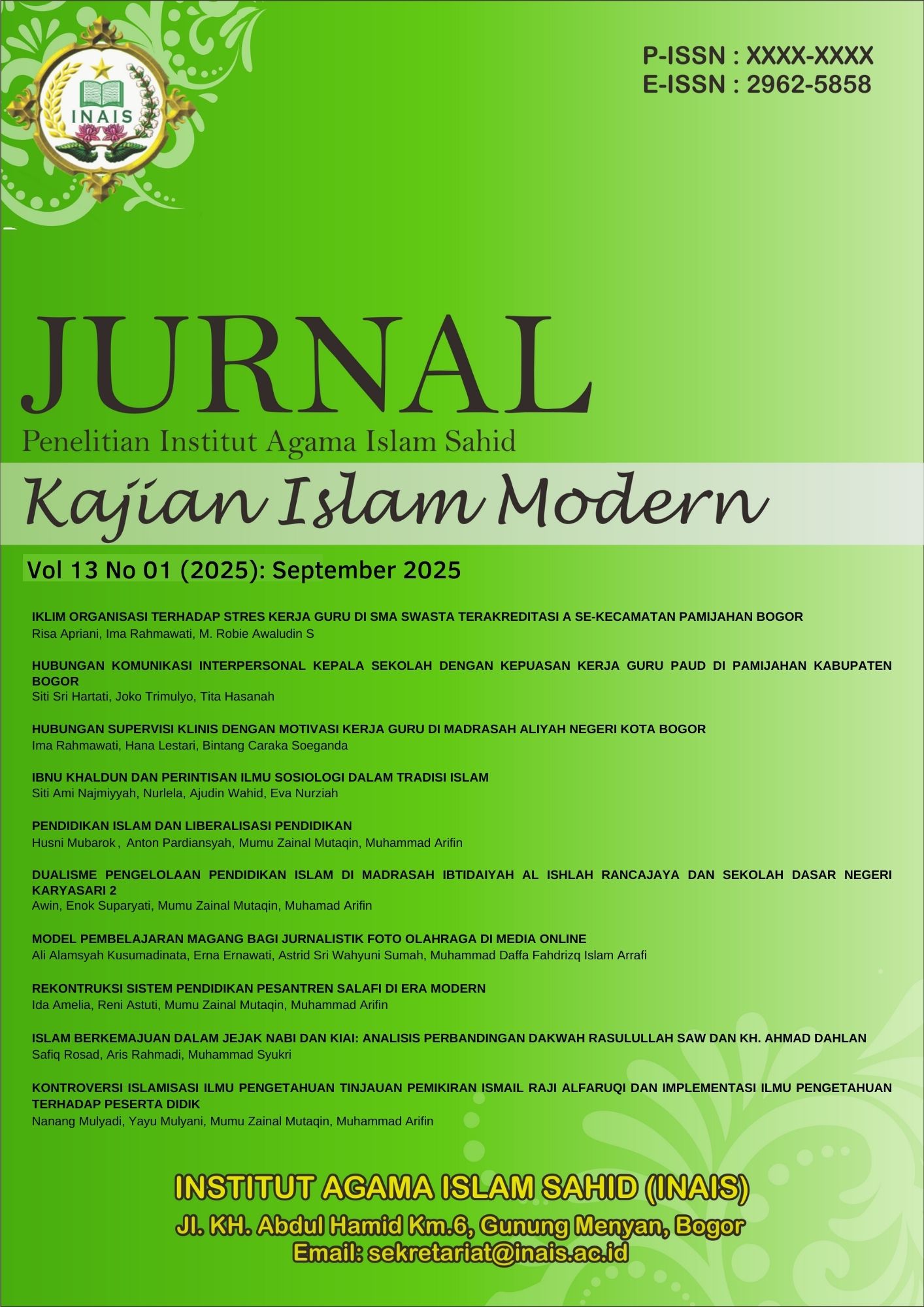ISLAMIC EDUCATION AND THE LIBERALIZATION OF EDUCATION
Main Article Content
Husni Mubarok
Anton Pardiansyah
Mumu Zainal Mutaqin
Muhammad Arifin
The liberalization of education has become a global phenomenon that has brought significant changes to various educational systems, including Islamic education. This study aims to analyze the impact of educational liberalization on Islamic education and explore solutions to integrate the two concepts. The research employs a literature review method by analyzing various academic sources, including books, journals, and official reports related to Islamic education and educational liberalization. The findings indicate that educational liberalization has both positive and negative impacts on Islamic education. On the positive side, liberalization improves access to quality education and encourages innovation in curriculum and teaching methods. However, on the negative side, there are threats to Islamic values due to the growing influence of secular culture. Previous studies suggest that liberalization may lead to a shift in values within Islamic education, necessitating effective adaptation strategies. To address these challenges, Islamic educational institutions need to adopt innovative approaches, such as integrating modern knowledge with Islamic teachings and implementing more interactive learning methods. Additionally, the role of governments and society is crucial in providing policy support and resources to ensure Islamic education remains relevant in the era of liberalization. This study concludes that Islamic education must adapt to changes without losing its identity. With the right strategies, Islamic education can continue to thrive and contribute positively to building a civilization grounded in Islamic values.
Abdurrahman. (2024). Metode Penelitian Kepustakaan dalam Pendidikan Islam. Adabuna : Jurnal Pendidikan Dan Pemikiran, 3(2), 102–113. https://doi.org/10.38073/adabuna.v3i2.1563
Abdurrahman, M. F. (2023). Liberalisasi Pendidikan Islam di Indonesia. Shibgoh: Prosiding Ilmu Pendidikan UNIDA Gontor, 1, 523.
Ahmad, A. (2021). Konsep Ta’dib Syed Muhammad Naquib Al-Attas dan Implikasinya dalam Pendidikan Islam. AN NUR: Jurnal Studi Islam, 13(1), 32–50. https://doi.org/10.37252/an-nur.v13i1.98
Asnawan, A., Bashith, A., & In Ratnasari, K. (2022). Dinamika Pendidikan Islam dan Liberalisasi Pendidikan di Indonesia. Attanwir : Jurnal Keislaman Dan Pendidikan, 13(2), 185–196. https://doi.org/10.53915/jurnalkeislamandanpendidikan.v13i2.247
Attas, S. M. N. Al. (1977). The Concept Of Education In Islam. In First World Conference on Muslim Education held in Makkah (Vol. 1, pp. 25–39).
Hadi, A. (2019). Dinamika Pendidikan Islam dan Liberalisasi Pendidikan di Indonesia. Falasifa, 11(1), 1–14.
Harahap, N. (2014a). Penelitian Kepustaka. Jurnal Iqra, 8(1), 68–73.
Harahap, N. (2014b). Penelitian Kepustakaan. Iqra’, 8(1), 1–14.
Ismael, F., & Husni, A. (2023). Karakteristik Pendidikan Islam di Banten. INNOVATIVE: Journal Of Social Science Research, 3(3), 55.
Masgumelar, N. K., & Mustafa, P. S. (2021). Teori Belajar Konstruktivisme dan Implikasinya dalam Pendidikan. GHAITSA: Islamic Education Journal, 2(1), 49–57. https://doi.org/10.62159/ghaitsa.v2i1.188
Sholihah, K. (2021). Perubahan Sosial (Sosial Change) Dalam Pendidikan Agama Islam. TA’LIM : Jurnal Studi Pendidikan Islam, 4(2), 114–131. https://doi.org/10.52166/talim.v4i2.2502
Thawabie, S. M., Hasanah, Hasanah, & Qaribilla, R. (2025). Pendidikan Agama Islam di Tengah Tantangan Sekularisasi dan Liberalisasi Pendidikan. Journal Scientific of Mandalika (Jsm), 6(5), 1343–1350.
The World Bank. (2020). The Promise of Education in Indonesia. In Australian Government. https://doi.org/10.1596/34807
UNESCO. (2004). Education for All.
Williamson Nalle, V. N. (2016). Mengembalikan Tanggung Jawab Negara dalam Pendidikan: Kritik Terhadap Liberalisasi Pendidikan dalam Uu Sisdiknas dan Uu Bhp. Jurnal Konstitusi, 8(4), 551. https://doi.org/10.31078/jk846



















